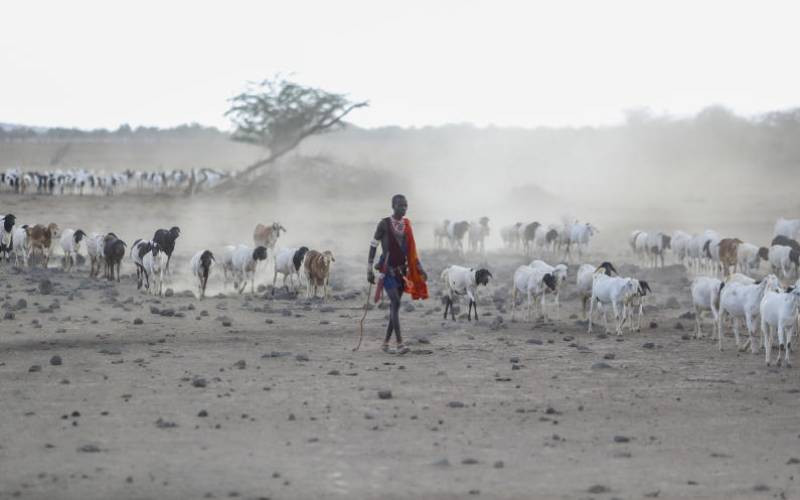
The adoption of a post-2020 global biodiversity framework is top of the agenda at the United Nations conference as the world faces "the greatest loss of species on Earth since the dinosaurs' demise."
"There is no planet B," Elizabeth Maruma Mrema, Executive Secretary of the UN Convention on Biological Diversity (CBD), told Xinhua ahead of the second part of the 15th meeting of the Conference of the Parties (COP15) scheduled for December 7-19 in Montreal, Canada.
"If actions are not taken with urgency," Mrema said, "we are going to perish with it." COP15 is expected to adopt a new global biodiversity framework with ambitious goals and specific action targets to achieve transformational change by the middle of the century, the CBD Secretariat said in a statement.
Representatives are called on to finalise and approve measures to arrest the dangerous, ongoing loss of terrestrial and marine biodiversity and create a more sustainable relationship between humanity and nature, with clear indicators to measure progress and adequate resources for implementation.
"Biodiversity is the foundation of life ... all of us have to prepare to take a role in terms of ensuring it's well maintained, well conserved, well restored, sustainably used in sharing the benefits equitably and fairly," Mrema said.
The second phase of COP15 follows the first part held last year in Kunming, the capital of southwest China's Yunnan Province, with the continued theme of "Ecological Civilization: Building a Shared Future for All Life on Earth." The Kunming Declaration was adopted during last year's conference, providing new momentum for a biodiversity conservation roadmap in the coming decade.
"What's at stake are the fundamentals of human existence. Biodiverse, well-balanced ecosystems provide climate moderation, fertile soil and foods, clean water, modern drugs, and the foundation of our economies," said Mrema, urging all parties to take action to secure the deal.
Key objectives
Land and sea-use change, over-exploitation, climate change, invasive species and pollution are the foremost causes of nature's decline, said Mrema.
The 2019 Global Assessment of Biodiversity produced by the Intergovernmental Science-Policy Platform on Biodiversity and Ecosystem Services warned that one million plant and animal species face extinction within decades - a rate of loss 1,000 times greater than natural.
The CBD Secretariat has announced that key objectives of the COP15 include ensuring whole of government and whole of society implementation of a new global plan to put nature on the path to recovery by 2030 and humanity on a path to its globally agreed 2050 vision of "Living in Harmony with Nature."
The meeting also aims to match the commitments of various parties with accountable actions and resources to implement the framework.
It also strives to engage public, private and philanthropic sectors to close the biodiversity finance gap by 2030, estimated to be around $700 billion (Sh85.8 trillion) a year, align trillions of dollars in global spending with goals for biodiversity and ensure biodiversity is considered in economic decisions.
The UN conference will also push for actions to reform, redirect or end subsidies that harm biodiversity, said the CBD Secretariat.
UN Environment Programme Executive Director Inger Andersen noted that, while progress has been made in the past, only six of the 20 Aichi Biodiversity Targets set in 2010 were partially met at a global level by the 2020 deadline.
"We need to do better," she said. "By recognising nature as a crucial ally, we can unleash human innovation in the service of sustainability and move towards the agreed vision of living in harmony with nature."
After several rounds of working group consultations, the post-2020 global biodiversity framework negotiations have progressed, but considerable differences remain on several key issues, said Zhao Yingmin, representative of the COP15 presidency.
"As the COP15 presidency, China has spared no effort to play a leadership and coordinating role during the negotiation," said Zhao, also vice minister of China's Ministry of Ecology and Environment.
During last year's COP15 meetings in Kunming, China announced it would take the lead by investing 1.5 billion yuan (about Sh26.3 billion) in establishing the Kunming Biodiversity Fund, which will support developing countries in biodiversity protection.
 The Standard Group Plc is a multi-media organization with investments in media
platforms spanning newspaper print
operations, television, radio broadcasting, digital and online services. The
Standard Group is recognized as a
leading multi-media house in Kenya with a key influence in matters of national
and international interest.
The Standard Group Plc is a multi-media organization with investments in media
platforms spanning newspaper print
operations, television, radio broadcasting, digital and online services. The
Standard Group is recognized as a
leading multi-media house in Kenya with a key influence in matters of national
and international interest.











